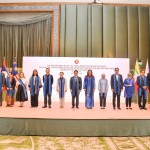Total number of posts 463.
The ASEAN-India Trade in Goods Agreement (AITIGA), which entered into force on January 1, 2010, is facing the risk of potential termination by India due to the prolonged review process and what India perceives as a lack of goodwill from ASEAN. Recent developments reflect a significant shift in India’s position and attitude toward AITIGA, as New Delhi adopts a more assertive and decisive approach to protect its national economic interests.
1. Reasons Behind India’s Tougher Stance
India considers AITIGA a "lopsided" agreement that does not bring commensurate benefits and even harms the domestic economy. A primary concern is the lax rules of origin provisions, which allow Chinese goods to flood the Indian market via ASEAN countries. This has led to a worsening trade deficit; India’s trade balance with ASEAN in 2022–2023 recorded a deficit of USD 43.57 billion, a sharp increase from USD 5 billion in 2010–2011.
Additionally, India claims ASEAN has shown little enthusiasm over the nine rounds of review negotiations (the negotiations has been launched since 2022), demonstrating a lack of goodwill. India believes some ASEAN Member States are deliberately stalling the process as they are benefiting significantly from the current FTA framework.
2. Provisions in AITIGA Disadvantageous to India
India argues that AITIGA has been fundamentally inequitable from the outset, particularly in tariff elimination commitments. While India committed to removing tariffs on 74.2% of tariff lines, the average commitment by ASEAN countries is 76.4%, a figure India believes is inflated due to Singapore's existing zero-tariff regime. Major economies such as Indonesia and Viet Nam only committed to eliminating tariffs on 50.1% and 69.7% of tariff lines, respectively, while countries like Cambodia and Laos committed at higher levels but are not significant trade partners for India. As a result, Indian industry has struggled to utilize the agreement effectively, with FTA utilization rates at only 30–40%, significantly lower than ASEAN countries like Indonesia, Cambodia, and Vietnam (65–70%).
3. Pressure from Domestic Industry
Major industry associations and enterprises in India, such as FICCI and leading industrial conglomerates, are increasing pressure on the government to push ASEAN to revise provisions that, in their views, are unreasonable, while also calling for stricter protective measures such as the imposition of more rigorous BIS (Bureau of Indian Standards) requirements on ASEAN imports.
Some stakeholders have proposed setting a time limit of 5–6 years for the validity of FTAs, ensuring periodic reviews and adjustments aligned with practical realities. Businesses in sectors like chemicals, electronics, and steel have warned that duty-free imports are discouraging domestic investment, distorting the tax structure, and undermining competitiveness.
4. Next Steps and the Possibility of Terminating AITIGA
AITIGA includes provisions allowing either India or ASEAN to issue a written notice to terminate the agreement, which would take effect 12 months after notification. While India has not officially invoked this clause, sources indicate that if ASEAN fails to present substantial improvement proposals at the 10th round of negotiations—scheduled for mid-July in New Delhi—India may seriously consider withdrawing from the agreement.
The Indian government expects ASEAN to demonstrate goodwill, accelerate the review process, and commit to specific measures to ensure balanced, fair, and effective trade cooperation. In a recent speech at the India Global Forum in London (June 19), Commerce Minister Piyush Goyal openly criticized FTAs signed by previous administrations, calling them “biased toward competitive economies” and likening ASEAN to "China’s B team."
5. Overall Assessment
India’s tough stance is a clear warning signal to ASEAN amid significant shifts in the regional and global trade landscape. The AITIGA review is not merely an economic requirement but also reflects India’s broader "Atmanirbhar Bharat" (Self-Reliant India) policy under Prime Minister Modi, where protecting domestic production and curbing trade deficits are top priorities.
India’s potential withdrawal from AITIGA could result in both sides losing access to a key trading partner, at a time when geoeconomic competition is intensifying.
Source: https://www.hindustantimes.com/













